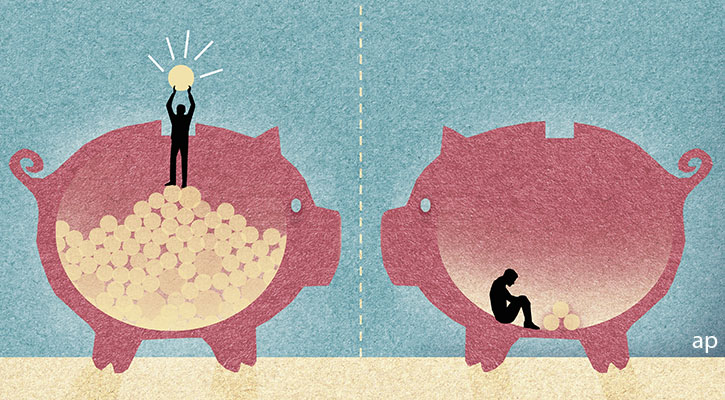
Until you make the unconscious conscious, it will direct your life and you will call it fate. Those are the words of Carl Jung, and they're directly relevant to your finances.
Many of the money choices people make are the result of unexamined attitudes and beliefs they hold about money, its role in their lives, and how to best employ it.
What is Financial Psychology?
Financial psychology is the study of why we do what we do with our money. It is a broad field that encompasses the cognitive, social, emotional, and cultural factors that come into play when people make financial decisions. Put simply: financial psychology is about the human (as opposed to the numeric) side of financial trade-offs.
For example, when someone inherits wealth after a loved one dies, they can sometimes have a hard time spending or enjoying that money because it feels like a betrayal of their loved one to benefit in any way from the death.
That has nothing to do with the money itself and everything to do with grieving, and its affects on financial behaviour.
What makes one person a big spender and another a diligent saver? It’s likely not their age, income, education, or gender but the way they each think and feel about spending and saving.
It is our thinking that drives our behaviour. If you want to make a lasting change to your financial behaviour, start by knowing your own mind.
How Does Psychology Affect Financial Choices?
Some financial decisions can be explained by cognitive psychology, which is focused on how the brain organises, processes, and retrieves information.
Take loss aversion, for example. The human brain feels the pain of a loss greater than the pleasure of an equal gain. That’s cognitive. We can’t change loss aversion; it’s just how our brains work.
When it comes to cognitive psychology, much of the time the best thing we can do is to get educated about the ways we might unconsciously misjudge trade-offs and then consciously compensate for that misjudgement.
Other financial decisions are influenced by social psychology, which focuses on how we relate to ourselves and others.
For example, someone may associate wealth with greed or exploitation because they grew up around people who vilified the rich. Another person may believe that financial success will win them friends, and thus enjoy buying rounds of drinks for others when they socialise.
These beliefs are the result of social psychology. In these examples, an attitude or belief that may start out as unconscious could be made conscious or changed if the person wants to do the work to change it.
Likewise, some people associate money with opportunity and freedom, so they use it to open doors, fund adventures, and make memories.
Others associate money with security and safety and hold on to as much as possible to preserve their peace of mind. If these two are spouses, there is great potential for conflict over financial priorities.
Arguing over which behaviours is “right” will likely be unfruitful, but understanding the deep psychological need that each behaviours serves can lead to shared understanding and creative problem solving.
How Can Financial Psychology Help Me?
You don’t need to be a financial mess or have major financial hang-ups to benefit from financial psychology.
Understanding your own financial attitudes and beliefs can help you make better decisions, improve understanding and communication with loved ones, and ultimately help you bring your finances into better alignment with your priorities.
A healthier financial mindset can also improve quality of life even if your finances don’t change at all.
There are some attitudes and beliefs that are strongly associated with financial well-being and others that are linked to financial stress and discontent. Learning the basics of a healthy financial mindset is a simple way to improve your financial quality of life and decision-making.
Getting Started
If you want to make changes to how you handle your money, a good place to start is to take stock of the attitudes and beliefs that you currently hold about money and ask, "Is this healthy? Is this serving me well? Is this even true?" If the answers are no, then you can start to challenge and reshape those beliefs.
Here are a few questions to get you started. There are no right or wrong answers. The purpose of these questions is to illuminate how you currently think and feel about money.
- Finish the sentence with one word: “Money is__________________.” Why do you believe this is true? What experiences or observations have taught you this?
- If money were a character in the story of your life, would it be a hero or a villain? A friend or a foe? Why?
- Growing up, what was your financial situation? How did the people raising you handle their money? Do you see any ways that this affects the way you think about or handle money today?
- How does money affect your social life, for good or ill?
- If money were not a consideration, how would you be living your life? Would it be very different from how you currently live? How do you feel about that? Do you see those emotions coming up in your financial behaviour?
In Conclusion...
When you make the unconscious conscious, you are no longer led by habit and reflex. Applying a conscious lens to the attitudes and beliefs that drive our behaviour allows us the opportunity to make changes where they can have the greatest impact: in our thoughts.
When thinking changes, behaviour naturally follows suit. Stay tuned for more on how to challenge and change problematic financial attitudes and beliefs.
Until you make the unconscious conscious, it will direct your life and you will call it fate.”— Carl Jung
Many of the money choices people make are the result of unexamined attitudes and beliefs they hold about money, its role in their lives, and how to best employ it.
What Is Financial Psychology?
Financial psychology is the study of why we do what we do with our money. It is a broad field that encompasses the cognitive, social, emotional, and cultural factors that come into play when people make financial decisions. Put simply: financial psychology is about the human (as opposed to the numeric) side of financial trade-offs.
For example, when someone inherits wealth after a loved one dies, they can sometimes have a hard time spending or enjoying that money because it feels like a betrayal of their loved one to benefit in any way from the death.
That has nothing to do with the money itself and everything to do with grieving, and its affects on financial behaviour.
What makes one person a big spender and another a diligent saver? It’s likely not their age, income, education, or gender but the way they each think and feel about spending and saving.
It is our thinking that drives our behaviour. If you want to make a lasting change to your financial behaviour, start by knowing your own mind.
How Does Psychology Affect Financial Choices?
Some financial decisions can be explained by cognitive psychology, which is focused on how the brain organises, processes, and retrieves information.
Take loss aversion, for example. The human brain feels the pain of a loss greater than the pleasure of an equal gain. That’s cognitive. We can’t change loss aversion; it’s just how our brains work.
When it comes to cognitive psychology, much of the time the best thing we can do is to get educated about the ways we might unconsciously misjudge trade-offs and then consciously compensate for that misjudgement.
Other financial decisions are influenced by social psychology, which focuses on how we relate to ourselves and others.
For example, someone may associate wealth with greed or exploitation because they grew up around people who vilified the rich. Another person may believe that financial success will win them friends, and thus enjoy buying rounds of drinks for others when they socialise.
These beliefs are the result of social psychology. In these examples, an attitude or belief that may start out as unconscious could be made conscious or changed if the person wants to do the work to change it.
Likewise, some people associate money with opportunity and freedom, so they use it to open doors, fund adventures, and make memories.
Others associate money with security and safety and hold on to as much as possible to preserve their peace of mind. If these two are spouses, there is great potential for conflict over financial priorities.
Arguing over which behaviours is “right” will likely be unfruitful, but understanding the deep psychological need that each behaviours serves can lead to shared understanding and creative problem solving.
How Can Financial Psychology Help Me?
You don’t need to be a financial mess or have major financial hang-ups to benefit from financial psychology.
Understanding your own financial attitudes and beliefs can help you make better decisions, improve understanding and communication with loved ones, and ultimately help you bring your finances into better alignment with your priorities.
A healthier financial mindset can also improve quality of life even if your finances don’t change at all.
There are some attitudes and beliefs that are strongly associated with financial well-being and others that are linked to financial stress and discontent. Learning the basics of a healthy financial mindset is a simple way to improve your financial quality of life and decision-making.
Getting Started
If you want to make changes to how you handle your money, a good place to start is to take stock of the attitudes and beliefs that you currently hold about money and ask, “Is this healthy? Is this serving me well? Is this even true?” If the answers are no, then you can start to challenge and reshape those beliefs.
Here are a few questions to get you started. There are no right or wrong answers. The purpose of these questions is to illuminate how you currently think and feel about money.
1. Finish the sentence with one word: “Money is__________________.” Why do you believe this is true? What experiences or observations have taught you this?
2. If money were a character in the story of your life, would it be a hero or a villain? A friend or a foe? Why?
3. Growing up, what was your financial situation? How did the people raising you handle their money? Do you see any ways that this affects the way you think about or handle money today?
4. How does money affect your social life, for good or ill?
5. If money were not a consideration, how would you be living your life? Would it be very different from how you currently live? How do you feel about that? Do you see those emotions coming up in your financial behaviour?
In Conclusion
When you make the unconscious conscious, you are no longer led by habit and reflex. Applying a conscious lens to the attitudes and beliefs that drive our behaviour allows us the opportunity to make changes where they can have the greatest impact: in our thoughts.
When thinking changes, behaviour naturally follows suit. Stay tuned for more on how to challenge and change problematic financial attitudes and beliefs.




























